New book tells mind-bending history of Willie Nelson's Fourth of July Picnics
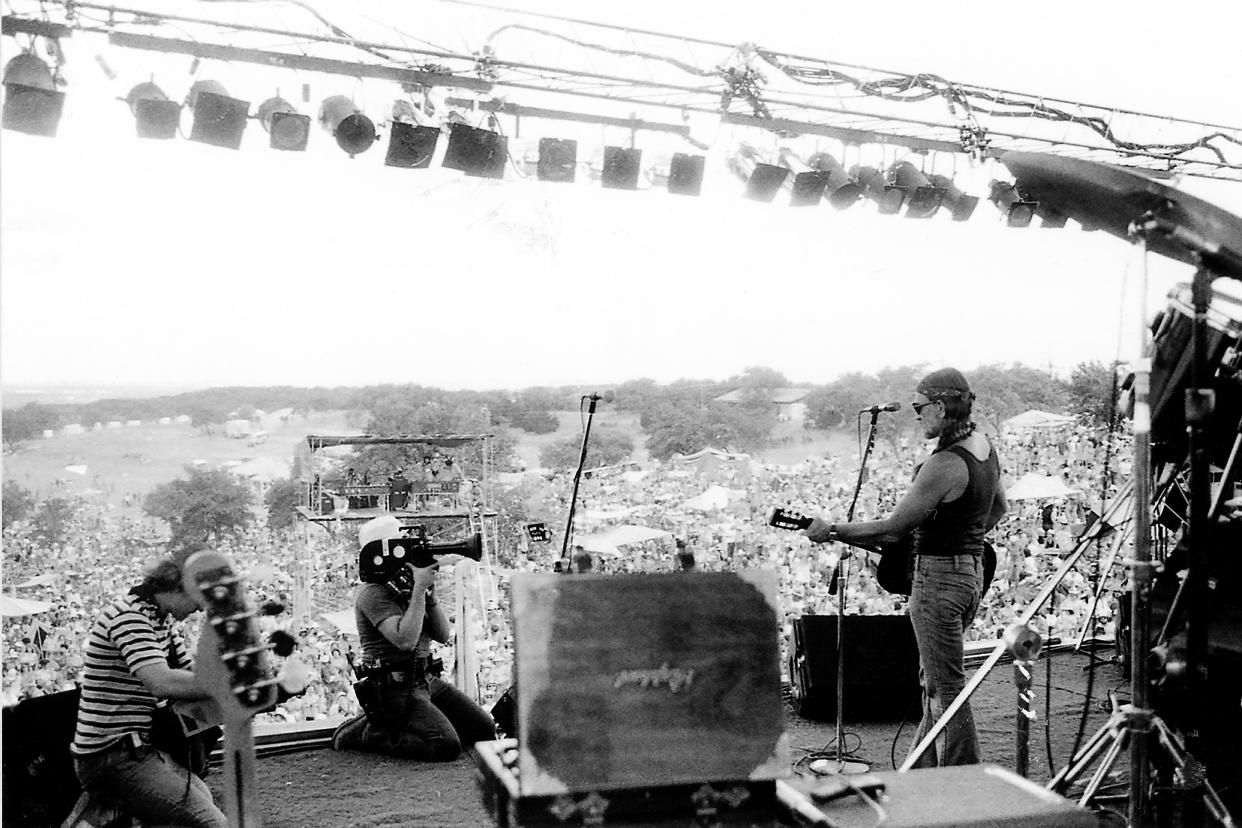
- Oops!Something went wrong.Please try again later.
- Oops!Something went wrong.Please try again later.
- Oops!Something went wrong.Please try again later.
If you pick up one book about Texas this summer, let it be "Picnic: Willie Nelson's Fourth of July Tradition."
Written by former American-Statesman journalist Dave Dalton Thomas, this entertaining and instructive history is more than a guide to the almost annual music festivals, associated since 1973 with Austin, but actually staged at locales scattered around the country. This summer, for instance, the Fourth of July fandango will take place in Camden, New Jersey, not all that far from where the Declaration of Independence was signed in Philadelphia.
"Picnic" is essential as updated biography, not only of Nelson, who turns 91 on Monday and whose days were earlier recorded in "Willie Nelson: An Epic Life," a book by Joe Nick Patoski, who provides the new history's introduction. It also expands our awareness of Nelson's talented family, dozens of other major musicians and an equal number of promoters, land owners and music writers, along with a vast community of festival goers.
The book chronicles changing musical tastes as well as the ups and downs of musical careers. In addition, it provides regular revisions of social mores: The antics of the first Picnics sound more like "Woodstock," the later ones closer to the standard family-friendly outdoor fests of today.
More: He gives the world hope: Willie Nelson inducted into the Rock & Roll Hall of Fame
Thomas, who covered many of the Picnics himself, reminds the reader just how miserably hot it could be, especially that time of year in Texas, without a blade of grass to offer shade. His deft prose is frequently funny, although given some of the chaotic situations he describes, Thomas need not stretch to illustrate the event's follies.
Perhaps most important, for all the research and analysis, Thomas remains a devout fan to the end. His awe of the players, especially the festival's namesake, shines through his journalistic polish.
In 2019, for Texas Independence Week, back before the Think Texas column and newsletter were born, Thomas and I collaborated on a list of 53 of the best books about the state. Of course we understood that we would make amendments to the list for the rest of our lives.
For my money, "Picnic" belongs on the list of the best books about Texas.
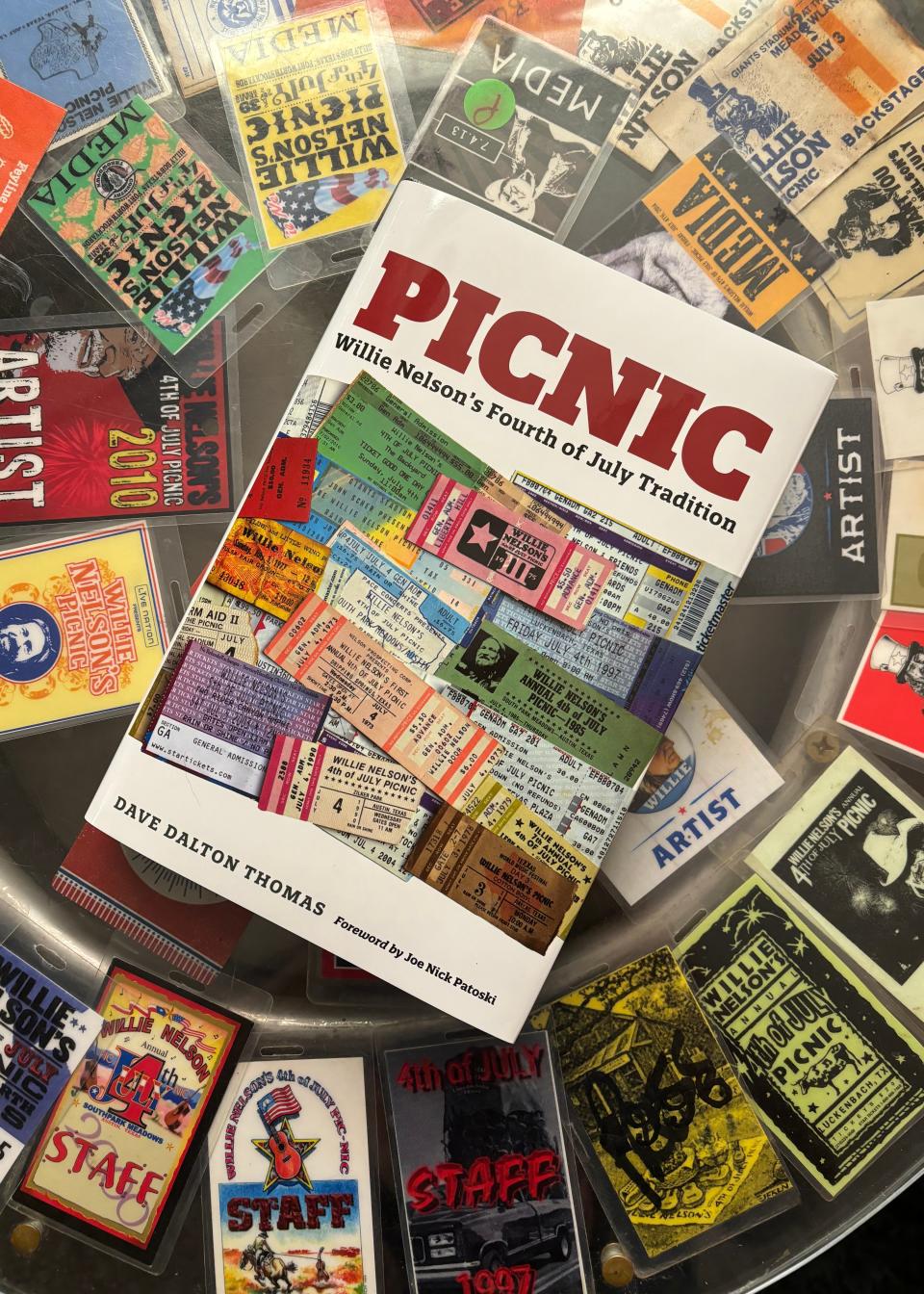
American-Statesman: I had no idea that the early Willie Nelson Picnics were so chaotic. The firearms! The nudity! The drugs! The completely disorganized management! Which was the worst and why? My bet is on Gonzales.
Dave Dalton Thomas: Absolutely, Gonzales in 1976. It was the height of the "Outlaw" country music era and the size of the crowd — an estimated 80,000 people — overwhelmed what security there was. The promoters were unable to provide basic sanitation needs. It was pretty much chaos. There was a lot of newspaper coverage of that Picnic ahead of the show because of the community's efforts to reject it. But I was very lucky to get sources who could tell me about the actual event, because for the most part, even journalists stayed away from that madness.
More: Texas history: On second thought, make that 60 essential books about our state
The Picnics appeared to find their rhythm at more controlled venues, such as Luckenbach and the Fort Worth Stockyards, at least after some initial stumbles. What made those events work?
The Luckenbach Picnics were definitely a mixture of the promoter's experience, the venue's preparation and the, uh, watchfulness of Gillespie County law enforcement. A lot of the crowd in Luckenbach were Generation X young folks who recalled the song "Luckenbach Texas" from our childhood. It just felt special.
The Fort Worth Picnics were the most fan-friendly Picnics because of the in-and-out policy. You could go somewhere and cool off out of the sun. You could go back to your hotel and change clothes. Do you want to see a 90-minute set by Gary Allan? Not me, I went to a nearby restaurant and had a steak in the air-conditioning instead of an $8 corndog. Then I hoofed it back to watch Willie close the show. For both shows, the performers were no longer counterculture figures like they might have been in the mid-1970s. Seeing Ray Price in Luckenbach or Bob Dylan in Fort Worth just didn't have that vibe that inspired people to take a bunch of LSD and run around naked shooting off fireworks.
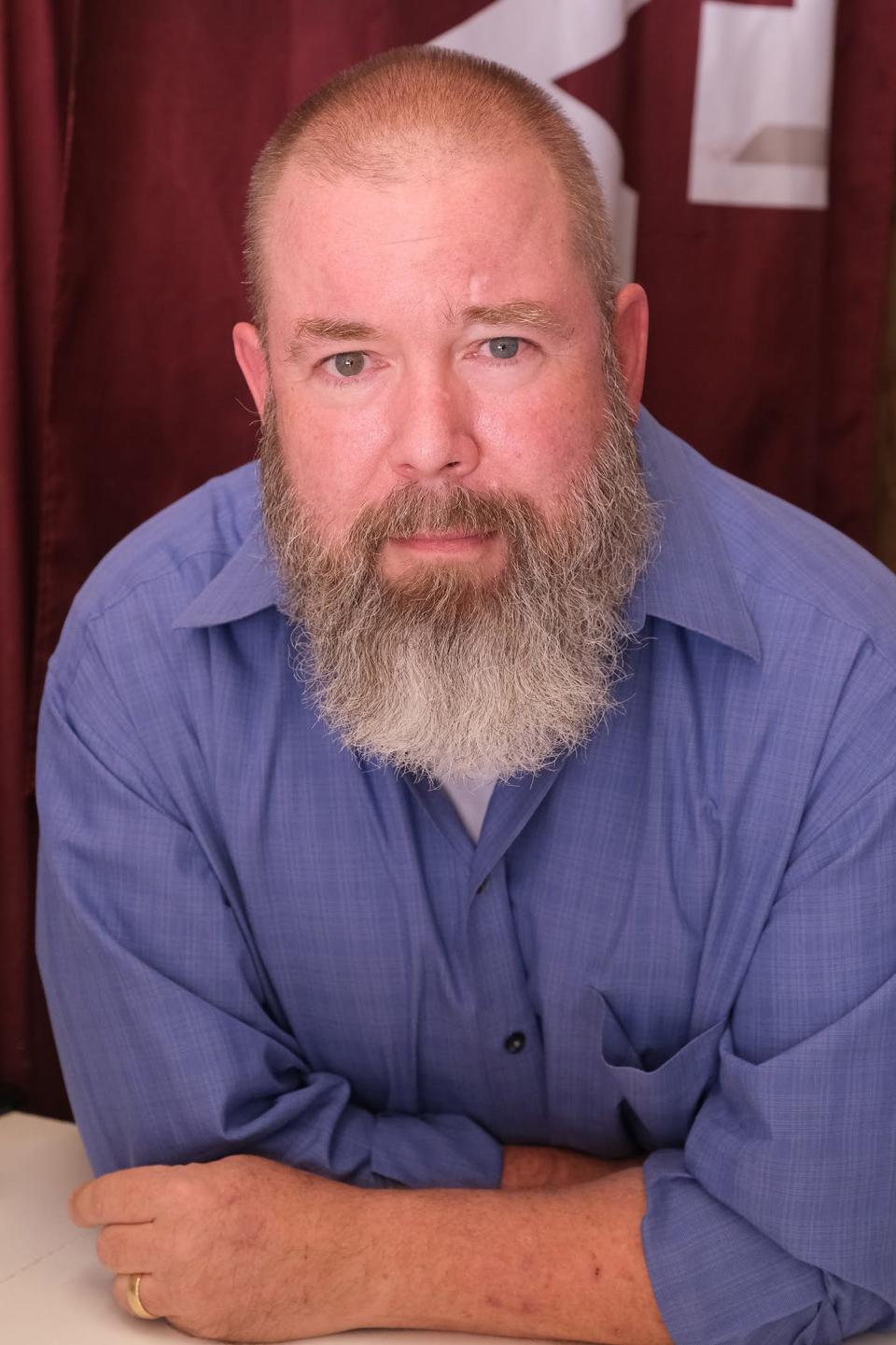
You record how often it was predicted during the past 50+ years that the Picnic had run its course. And yet it came back. Talk about how much it meant to Nelson to gather his friends and family together for the event, and how much Nelson deeply enjoyed songwriters across a range of genres.
The closer my source was to Willie, the more likely they were to say that the reason he had the Picnics was that it was a reunion for friends and family. You could see it in the lineups, which for years had many of the same performers year after year. This was so important to Willie that when the Fort Worth Picnics proposed having two stages, on the north and south ends of the field, Willie didn't like it at first because it meant that all the buses wouldn't be in the same place. Fort Worth had to promise an alley linking the two performance areas where VIPs could easily go to Willie's bus via golf cart.
As for "range of genres," I'm not even sure Willie thinks in terms of genre. There's just music and if it moves Willie, it's Picnic-worthy. That was definitely one of the special things about the Picnic, being introduced to someone I wouldn't otherwise see — such as the Bells of Joy or Little Joe y la Familia.
More: Readers pitch their favorite Texas books
In addition to compiling a thorough history of the Picnics — including astoundingly detailed appendices — you recorded the rise and fall careers of musical acts across time. Besides, the family, who were the acts mostly closely identified with the Picnics and why?
There was a cadre of Picnic regulars who would appear more likely than not. Superstars such as Kris Kristofferson or Merle Haggard might come and go, but it didn't feel like a Picnic without Ray Wylie Hubbard, David Allan Coe, Billy Joe Shaver, Johnny Bush, Ray Price, Asleep at the Wheel or Leon Russell. Yes, and the Geezinslaws, too. The reason for this is simply Willie's devotion to his friends. He didn't want to leave anybody off if they wanted to come.

I like your structural choice to focus on one key Picnic in each chapter in detail, then to provide a short description of the others from that era. It works. How did you come to that decision?
My first thought in structuring the book is that I wanted to represent the Picnic across the history of the event. A lot of Willie biographies tell his story up through the IRS issue in the early 1990s and then trail off into "he lived happily ever after." Where another book might have focused on the 1970s Picnics, I thought there was value in talking about how things changed in 1984, how the Picnic was "reborn" in 1995, how it felt in 2015.
Picking the 10 Picnics was mostly easy, though the choice not to have a full chapter on the 1974 Picnic was a very difficult one. But 1974 is the most well-documented Picnic outside of my book, so I focused on 1976 instead. Adding the short descriptions of the other Picnics was necessary to be a complete history of the event, but also because there were some years in particular that had moments that needed chronicling, such as Waylon Jennings in Luckenbach in 1996.
More: Happy birthday to Willie Nelson: We like him just the way he is
We also get to know all the characters behind the scenes, including the locals. Among the most controversial is promoter Tim O’Connor. Talk a bit about his role in the Picnics, and how you developed a relationship with him right before his death.
Tim O'Connor promoted many Picnics between 1974 and 2010, including half of the Picnics I wrote about in detail. He probably knew more about the history of the event than anyone else I could interview. Because of my deadlines, in most instances, if I couldn't secure an interview with someone after a couple tries, I moved on. But I kept pursuing Tim because I knew he was vital to the project. What I didn't know was that he was dying of cancer.
I finally managed to go visit him during a good stretch and he saw that I was very serious about the project and I believe that he saw a chance to have his story told, even the troublesome parts. I'd visit when he was well enough and we'd talk Picnics as long as he could. It was an honor for him to devote some of his remaining time to me and I'm grateful for it.
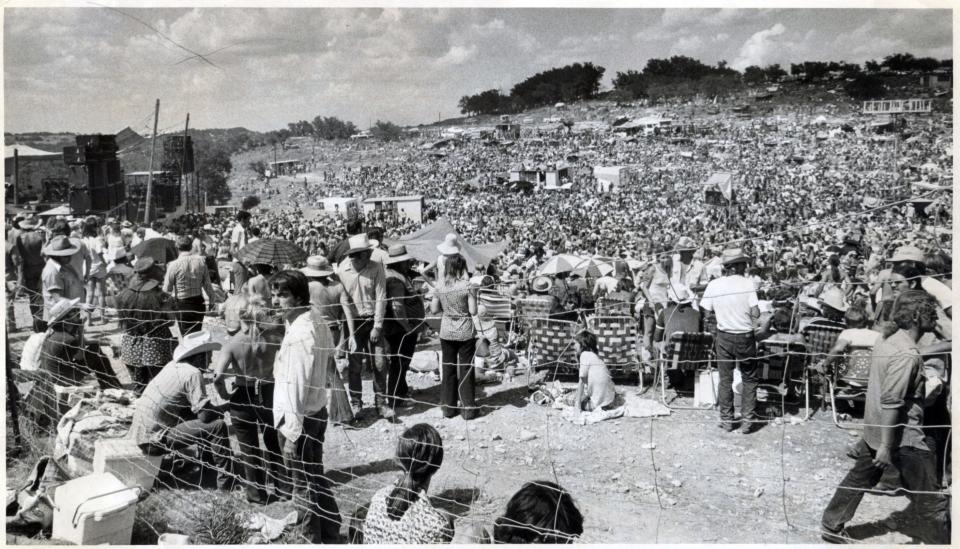
This book is fun! I know it was a lot of work. Decades of work. But you were on the scene for so many years. What made the project fun for you?
The first person I interviewed for the book who I didn't already know was Melinda Wickman Swearingen, the photographer who provided the images for Jan Reid's "The Improbable Rise of Redneck Rock." She told me to not focus on the finished product, but to enjoy the process of creating the book. I took that very much to heart.
This book doesn't happen unless I love the Picnics and love the history. So I took great joy in getting to talk to people who I wouldn't otherwise get to talk to — Connie Nelson, Terry Allen, Scott Newton, among many. After I did a phone interview with Joe Ely, he sent me a couple of texts. I'm not sure why it feels so cool to get a text from Joe Ely, but it does.
I was interviewing Freddy Fletcher at Arlyn Studios and his phone kept buzzing. Finally, he answered it, "Mom, I'm doing an interview, can I call you back?" Well, mom was Bobbie Nelson. That was a fun moment. I stood on the site where the Gonzales Picnic happened. I made friends during the process. Now I just have to hope they like the book.
More: 40 years ago, Dripping Springs Reunion helped create Austin's musical identity
Near the end of the book, you describe the Picnics staged at the Circuit of the Americas, a far cry from the open pastures of early Picnics. It seemed emblematic, not only for the tradition, but also for Austin and Texas. How did you strike a balance between the tug of nostalgia and the recognition that things change?
The No. 1 thing I've learned from being a lifelong Willie Nelson fan is that a person can like old things without being beholden to old times. Willie is very much a progressive person who has always been able to embrace the new, all while still liking the singing cowboys and gospel songs he grew up on. I'm trying to adopt the same outlook — nostalgia is more than a tug for me — and it felt right to give the new the same respect and scrutiny as the old.
Thinking back, I don’t think you revealed your favorite Picnics. Which were they and why?
I certainly have favorite moments from across the years, but to pick two favorite years would be 1996 in Luckenbach and 2014 in Fort Worth. The '96 Picnic was my second one, so this time I had some awareness of how it was going to go. I covered it for the San Angelo Standard-Times and got to interview Willie on his bus. This was my fourth Willie interview, but the first one where I didn't feel like I completely flubbed it.
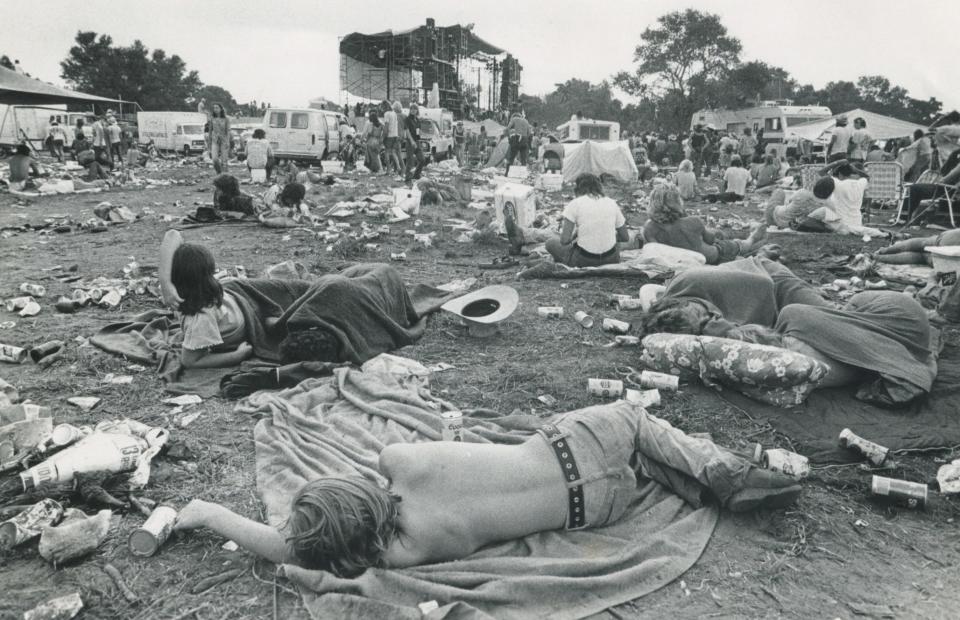
The '96 Picnic was in the midst of a Texas drought so it was very hot that year, which wasn't that enjoyable at the time, but it makes for an epic memory now. And the '96 Picnic was the one where Waylon Jennings performed in Luckenbach for the first and only time. The 1996 Picnic felt like I was part of a historic moment.
The 2014 Picnic wasn't as epic, but it was my seventh at the Fort Worth Stockyards and I knew all the ins and outs, who to talk to, who to avoid, how to minimize discomfort ... basically I just had a really good time covering that one.
Inside baseball, but I was impressed by how many people you were able to interview. You dug deep into the archives and you took your own notes onsite, but you also talked to just about every Texas music writer I know. How did you convince them all to jump on board?
One thing I didn't realize until much later was that launching this book at the start of the COVID pandemic might have worked in my favor. Yeah, almost all of my early interviews were phone interviews, but a lot of the people I was talking to were used to working and living in the public eye. Now they were sitting at home by themselves.
There were a lot of artists I didn't get to talk to — I'm sure some managers and publicists were like "who in the hell is 'Dave Dalton Thomas?'" — but the people I did get seemed happy to have someone to talk to and might have said more than they otherwise would have.
As for talking to music writers specifically, I think one thing that has really made a difference in my writing career over the past decade is finally being able to ask for and accept help from others. There was no convincing needed, every writer I approached was supportive and I'm grateful to all of them.
Michael Barnes writes about the people, places, culture and history of Austin and Texas. He can be reached at mbarnes@gannett.com. Sign up for the free weekly digital newsletter, Think, Texas, at statesman.com/newsletters, or at the newsletter page of your local USA Today Network paper.
This article originally appeared on Austin American-Statesman: Book shares history of Willie Nelson's Fourth of July Picnics

